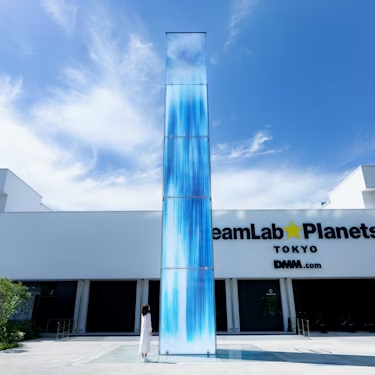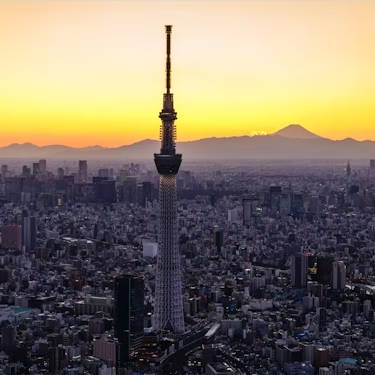More about: Best Things To Do In Tokyo In 3 Days
Besides being the anime capital of the world and a landmark for its museums and technological sites, there is an infinite variety of things to see and do in Tokyo. In this city you will find a combination of the latest technology and ancient traditions that leave visitors fascinated.
If you don't have much time to explore the city, don't worry, because in this 3-day itinerary I propose you will be able to see the highlights, from its skyscrapers to its natural beauties, including its temples. You'll be able to visit the most important sights in Tokyo and make the most of your time during your stay.
Day 1: Tokyo Sightseeing Tour, National Museum of Emerging Science and Innovation and Night Photo Tour
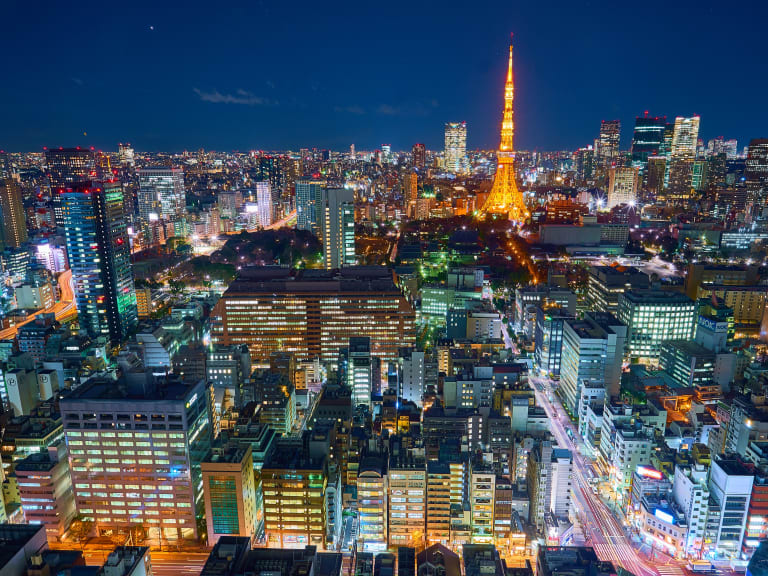
On the first day of your stay in Tokyo you will get to know the city in a fun way. After your first tour of the city, you will have lunch and in the afternoon you will visit the National Museum of Science and Innovation.
I suggest you finish the day with a night tour so you can take the best pictures of the city.
Guided city tour to get to know Tokyo
There are several options for guided tours in Tokyo, either on foot, by bicycle or by rickshaw.
My advice is that to see the most important places, it is best to decide to take a walking tour and start early in the morning.
Private and personalised tours (just for you and your group, based on your personal preferences) can last from 2 to 7 hours, depending on what you want to see.
The price for this type of tour is around 390 euros (the most basic two-hour option) and includes the guide and hotel pick-up, but does not include transport from one point in the city to another, nor does it include meals and drinks. It also does not include entrance to the museums, you will only see them from the outside.
A 3-hour tour is enough to see the main sights of Tokyo from the outside and at the same time save money for other activities in the city. The advantage of opting for a private, personalised tour is that the tour is based on your preferences so you won't waste time doing things that don't interest you.
Lunch near the National Science Museum
After you have finished your tour of Tokyo, I recommend that you go for lunch at one of the many restaurants in the city. You should choose one in the area of the National Museum of Emerging Science and Innovation, which is your next stop.
The National Museum of Emerging Science and Innovation Restaurant is the quickest option as it is inside the museum itself.
National Museum of Emerging Science and Innovation
Tokyo is synonymous with technology. It is one of the most modern cities in the world and the birthplace of great innovations. Science is central to the lives of Tokyo residents and Tokyo has one of the world's most important science museums.
The National Museum of Emerging Science and Innovation, also known as Miraikan, has a wealth of exciting interactive exhibits in three permanent displays.
In the 'Explore The Frontiers' exhibit, you can learn about space exploration by stepping inside a model of the International Space Station. Also available is the Discover Your Earth exhibition, where you'll find a large sculpture of the Earth made from LED panels, as well as the robotics-based Create Your Future exhibition, where you'll meet Honda's impressive ASIMO robot.
The museum also has science workshops for children, making it one of Tokyo' s favourite things to see and do with kids for the little ones.
It will take you a minimum of 2-3 hours to tour the entire museum with time to enjoy all the exhibits.
- Opening hours: The museum welcomes visitors from 10am to 5pm, Wednesday to Monday.
- How to get there: The museum is easily accessible from Fune-no Kagakukan and Telecom Center underground stations.
- Price: Admission for adults costs around 5 euros and for children under 18 around 2 euros.
Traveller Tip
Take the opportunity to visit the museum on Saturdays, as children under 18 get in free.
Tokyo Night Photo Tour
After a hectic day of sightseeing and learning about the latest developments in science, it's good to relax. On this first day you'll finish your itinerary with an evening photo tour of Tokyo to capture the best of the city with your camera.
Tokyo takes on a whole new dimension at night with its illuminated signs and the city vibrates in a different way. You'll be able to capture it all on a guided photo tour at night.
These tours take you on a two-and-a-half hour tour of the must-see places to take the best photos. The guides are professional photographers and the tour costs approximately 200 euros.
At the end of your photo tour, I advise you to return to the hotel to rest and prepare for your second day of activities in Tokyo, which will be dedicated to traditions and history.
Day 2: See Yanaka, Tokyo's old town, the Tokyo National Museum and a night food tour of Shibuya
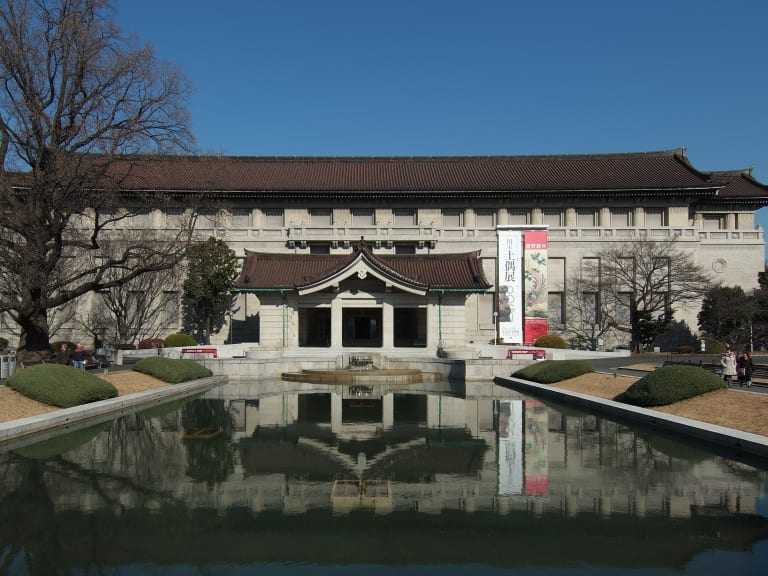
Japan is not only synonymous with technology, it is also synonymous with tradition, and Tokyo is no exception.
On the second day of this itinerary you will discover the most traditional side of the city and learn about the important events that marked its history.
You will end the day with a gastronomic tour to taste the wonders of Japanese cuisine.
Tour of Yanaka: Tokyo's nostalgic old town
On this tour, you will leave the madness of the modern part of the city and its skyscrapers behind to discover one of Tokyo's oldest and most traditional neighbourhoods.
The Yanaka area of Tokyo is famous for being one of the most picturesque and oldest parts of the city. It was spared from Allied bombing during World War II and survived the Great Kanto Earthquake and Fire of 1923.
It was a thriving craft town that was home to some of the country's most famous writers and visual artists.
See the temples, handicraft workshops and traditional activities of Yanaka
The area is home to a great diversity of handicrafts: textiles, ink prints, wood carvings, stationery, ceramics and jewellery. If you visit Tokyo in search of traditional Japan, you must spend a day in the Yanaka area, where temples abound and history abounds.
In the centre of the neighbourhood you'll find the Yanesen Tourist Information Centre where you can take part in traditional Japanese activities such as calligraphy workshops and tea ceremonies.
- Duration: The tour of Yanaka, lasts around 3.5 hours and takes you around the most important places in the area.
- Price: The price is around 80 euros per person, but does not include transfers, meals or entrance fees.
Visit the Tokyo National Museum
The Yanaka district is very close to your next stop. If you're interested in history, the Tokyo National Museum is the place to visit.
This museum is one of the most important in the country, housing some 116,000 pieces of art and artefacts covering the entire history of Japan. In this article you can find all the information about tickets to the museum.
Strolling through the corridors of its many buildings, you can see relics such as samurai armour and swords, delicate ceramics, kimonos, calligraphy, some of which have been declared national treasures, and important cultural properties by the Japanese government.
You can also see items from all over Asia, including Buddhist scrolls dating back to the year 607.
Touring the Museum will take about 3 hours, so after the visit you will be back at the hotel in time to shower, change clothes and go out to enjoy the last activity of the second day's itinerary, an evening gastronomic tour.
- Opening hours: The museum welcomes visitors from 9.30am to 5pm daily, except Mondays, when it is closed.
- How to get there: The museum is easily accessible from the nearest underground stops, Uguisudani and Ueno underground station.
- Price: Admission costs around 6 euros.
Traveller Tip
Take the opportunity to visit Ueno Park before or after visiting the museum, it's right next door.
Shibuya nighttime food tour
On this evening food tour you'll be able to sample some of Japan's signature dishes such as kobe beef skewers, Osaka-style takoyaki (octopus balls) and traditional sushi.
You will visit a depachika (underground dining area) while your local guide tells you culinary facts that only locals know.
The Shibuya area is one of the least known by tourists and one of the most frequented by locals in search of excellent food.
Tokyo food tours are the ideal way to learn about Japanese culture as well. They usually include stops at several typical restaurants and tastings are included in the price, around 195 euros per person.
After dinner, you will return to the hotel to rest and prepare for your last day in Tokyo, reserved for visiting the natural wonders close to the city.
Day 3: Excursion to Mount Fuji and the ice caves of Aokigahara Forest, Sensoji Temple, Imperial Palace
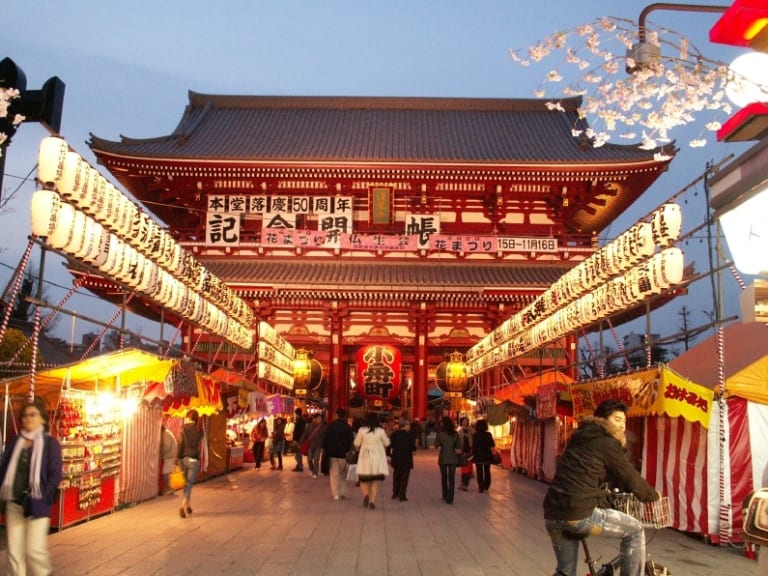
If you're travelling to Tokyo, you can't miss Mount Fuji and the ice caves, two of Japan's natural wonders.
Both of these attractions are outside the city, but there are several options for excursions to Mount Fuji from Tokyo.
When you return to the city after your tour, you will finish the day by visiting two of Tokyo's most important and significant buildings, the Sensoji Temple and the Imperial Palace.
Excursion to Mount Fuji and the ice caves of Aokigahara Forest
Mount Fuji, considered a sacred mountain for centuries by the Japanese, is a must-see for those travelling to Japan, not only for its beauty but also for the history woven around it.
Excursions to Mount Fuji also include a visit to the ice caves of the Aokigahara Forest, where there are no railings or lights available, so it can be a bit dangerous if you want to go on your own.
On guided tours, you will be accompanied by experienced guides and provided with the necessary equipment to do the tour safely. Tours of this type cost approximately 68 euros and last about 3 hours.
After this natural adventure, you will return to Tokyo to have lunch, shower and change for the afternoon's activities, a visit to two of the city's landmarks: the Imperial Palace and Sensoji Temple.
Sensoji Temple
Sensoji Temple is the oldest religious site in Tokyo and is also the most visited, with some 30 million visitors a year, dating back to the year 628.
However, despite its age, the current structures are relatively new reconstructions of earlier buildings because during World War II, almost the entire temple was destroyed.
Sensoji Temple is dedicated to Asakusa Kannon, the Buddhist god of mercy and happiness. Buddhists and interested tourists alike flock to this attraction in the hope that the presence of Kannon's healing powers will infect them.
Touring the temple takes one to two hours. When you finish your visit you will go to the last destination of your 3-day Tokyo itinerary, the Imperial Palace.
- Opening hours: The temple grounds are open 24 hours a day, with the main hall welcoming visitors daily from 6am to 5pm. From October to March, the hall opens a little later, at 6.30am.
- How to get there: Sensoji Temple is easily accessible via Asakusa Station.
- Price: it is free, but offerings of money are often left.
Imperial Palace
The Imperial Palace is not a place with many tourists due to a policy limiting the number of visitors, as it is the home of the Emperor of Japan and his family.
Entry to the palace is very difficult to get: you have to apply several weeks in advance and access to the inside of the palace itself is even more difficult. To apply, you must register on the official website of the Imperial Palace.
- Opening hours: Tours of the palace are at 10:00 and 13:30 from Tuesday to Saturday and usually last one hour and fifteen minutes.
- How to get there: The nearest metro station is Nijubashi-mae.
- Price: free of charge.
I hope you enjoyed this Tokyo itinerary as much as I did. If you have more days to explore the city, you can check out our itinerary of things to see and do in Tokyo in 7 days.
- Day 1
- Guided city tour
- National Museum of Emerging Science and Innovation
- Tokyo Night Photo Tour
- Day 2
- Yanaka Tour
- Tokyo National Museum
- Shibuya Night Food Tour
- Day 3
- Excursion to Mount Fuji
- Aokigahara Forest Ice Caves
- Sensoji Temple
- Imperial Palace


